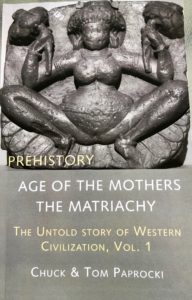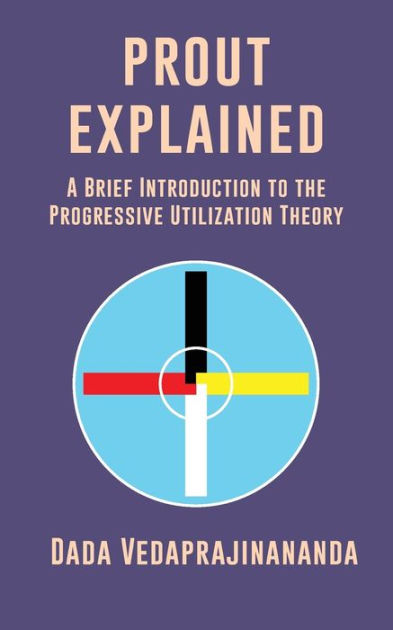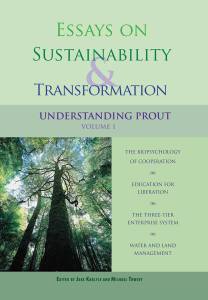Books on Prout
Books by P.R. Sarkar, founder of Prout
Proutist Economics: Discourses on Economic Liberation
Proutist Economics has brought all of the author’s published discourses on economics together in one volume for the first time. The author states that economics should free human beings from mundane problems so that all will have increasing opportunities for intellectual and spiritual expansion.
LIBERATION OF INTELLECT: NEOHUMANISM
Calcutta, AM Publications, Fourth Edition, 1999.
Liberation of Intellect: Neohumanism, sets out a new dimension in social and spiritual philosophy. On one level, Neohumanism is a new philosophy that synthesizes three grand wisdom traditions: the environmental tradition of indigenous peoples world-wide, the humanist tradition of Europe, and the spiritual tradition of the Indian sub-continent. On another level, it moves far beyond these traditions to create something altogether new.
HUMAN SOCIETY
Calcutta, AM Publications, Second Edition, 1999.
Human Society contains two parts. Part one, first published in 1959, analyzes modern society from the vantage point of universal humanism, while part two, first published in 1963, analyzes human history from the perspective of collective psychology.
RELATED PUBLICATIONS
Prout Explained: A Brief Introduction to the progressive Utilization theory
This booklet is a short introduction to the basic features of this economic model, showing how its emphasis on cooperatives and economic democracy can cure the problems of today. The principles upon which Prout is based are explained as is its vision for an improved system of political democracy and eventually an effective world government.
AFTER CAPITALISM: ECONOMIC DEMOCRACY IN ACTION REVISED EDITION
Dada Maheshvarananda
A grassroots movement for economic democracy based on cooperatives and local economies is quickly growing throughout the planet. After Capitalism, inspired by P.R. Sarkar’s Progressive Utilization Theory (Prout), offers a compelling vision of an equitable, sustainable model which economically empowers individuals and communities. Filled with successful examples from six continents as well as many resources, activities and tools for activists, After Capitalism will fill you with hope and the conviction that a new, democratic economy is indeed possible.
GROWING A NEW ECONOMY: MOVING BEYOND CRISIS CAPITALISM AND ENVIRONMENTAL DESTRUCTION
Roar Bjonnes and Caroline Hargreaves
An increasing number of experts agree—today’s financial and environmental crisis is a sign that something is fundamentally wrong with our economy.
But the same experts, however, have yet to present a viable alternative. Growing a New Economy does just that.
The economic reforms we have seen in recent years—be they conservative, leftist, or green—have been unable to alter the destructive course of our economy. It’s time for systems change. It’s time to move from the power of the corporation to the power of cooperation, from the centralized power of the board rooms to the decentralized power of economic democracy.
Growing a New Economy presents integral solutions to our economic problems that will be vitally important in the future restoration of our economy and our rapidly deteriorating ecosystem.

PRINCIPLES FOR A BALANCED ECONOMY: AN INTRODUCTION TO THE PROGRESSIVE UTILIZATION THEORY
Roar Bjonnes
This book introduces P. R Sarkar’s Progressive Utilization Theory, an alternative, economic vision that transcends both capitalism and socialism yet incorporates important elements of both.
This new, economic model extends the existing democratic ideals into the economic arena and suggests that economic democracy―more balance between the local and global economy, fair wages, worker ownership, and environmental sustainability―is key to the formation of a progressive and balanced economy.
PROUT IN POWER (2017, PDF)
Sohail Inayatullah
Proutist Bloc India Publications, New Delhi, 2017
This book imagines a future where Prout is in ‘power’. It uses Prout to reframe the issues of the time so that innovative solutions can be created. Chapters articulate Prout policy on topics such as:
- Higher education
- Crime and prisons
- Poverty and wealth
- Power and policy-making
- Yoga and economics
- E-Health and new digital technologies
- The alternative futures of Asia
- The Arab Spring
Working with innovative movements all over the world, Prout provides the epistemology, methodology, and vision for a different future, and, thereby, present.
UNDERSTANDING SARKAR: THE INDIAN EPISTEME, MACROHISTORY AND TRANSFORMATIVE KNOWLEDGE
Sohail Inayatullah
Leiden, Brill, 2002
Chapters discuss Sarkar’s unique contributions, Prout strategy (a central element is movements that organize the oppressed), Sarkar in the context of the Indian episteme (the goal of his theory is to create a condition where the physical, social and cosmic worlds are in harmony), Sarkar’s theory of history (the classic cyclical historical viewpoint, with the possibility of spiritual and economic transformation allowing an exit from history), Sarkar in the context of other macrohistorians, and his social laws critiqued from various positions.
SITUATING SARKAR: TANTRA, MACROHISTORY AND ALTERNATIVE FUTURES
Sohail Inayatullah
Maleny, Gurukula Press, 1999
In this unique analysis, Inayatullah examines the narratives of Prabhat Ranjan Sarkar from historical, comparative and poststructural modes of analysis. Inayatullah’s inquires into Sarkar’s works, and compares him to such diverse thinkers as Ssu-Ma Chien, Ibn Khaldun, Montesquieu, Aurobindo, Gandhi and Foucault. Sarkar’s social movements are contrasted to ecological, capitalist and local models of society and economy. Inayatullah also applies Sarkar’s theories to various problems in modern social theory: the problem of representation and governance; the issue of agency versus structure; the politics of language and the real; the tension between the local and the global; and the science/culture debate. As with Sarkar’s works themselves, Inayatullah takes a balanced approach, investigating economic, social and transcendental discourses along with a critical interpretation of Sarkar’s vision of the future.
UNDERSTANDING PROUT: ESSAYS ON SUSTAINABILITY AND TRANSFORMATION – VOLUME 1
Edited by Jake Karlyle and Michael Towsey
This first volume of Understanding Prout – Essays on Sustainability and Transformation was published in 2009 to mark the 50th anniversary of the founding of the Progressive Utilization Theory (Prout). Prout is arguably the only socio-economic theory to emerge out of the Third World that has direct applicability to the developed world. It offers a new vision of society based on cooperation rather than competition and domination.
The first essay in Volume 1, “The Biopsychology of Cooperation”, explores cooperation from an ethical, social and cultural perspective. The second essay, “Education for Liberation”, introduces Sarkar’s philosophy of Neohumanism as the essential ingredient of an education for cooperation and liberation. The third essay, “The Three-Tier Enterprise System”, introduces cooperatives from the traditional economic perspective and compares them with the more usual private and public enterprises. Finally the fourth essay, “Water and Land Management”, explores the implications of ecosystem management and biotechnology and examines how to work with ecological and biological processes rather than usurp them.
The untold story of western civilization – Volumes 1 to 5
Chuck & Tom Paprocki
The 5 volumes of The Untold Story of Western Civilization by Chuck and Tom Paprocki are now published and available on Amazon and Barnes and Noble.
These volumes are an analysis of Prout’s macrohistory, a way of looking at the development of society as cycles, and are told from the perspective of a universal human being.
These five volumes offer a comprehensive look at the beliefs and events that form the substance of our collective subconscious programming that particularly characterizes white peoples today and that keeps us from uniting as a human society to face clear and present dangers that confront all of us as members of the human race.










